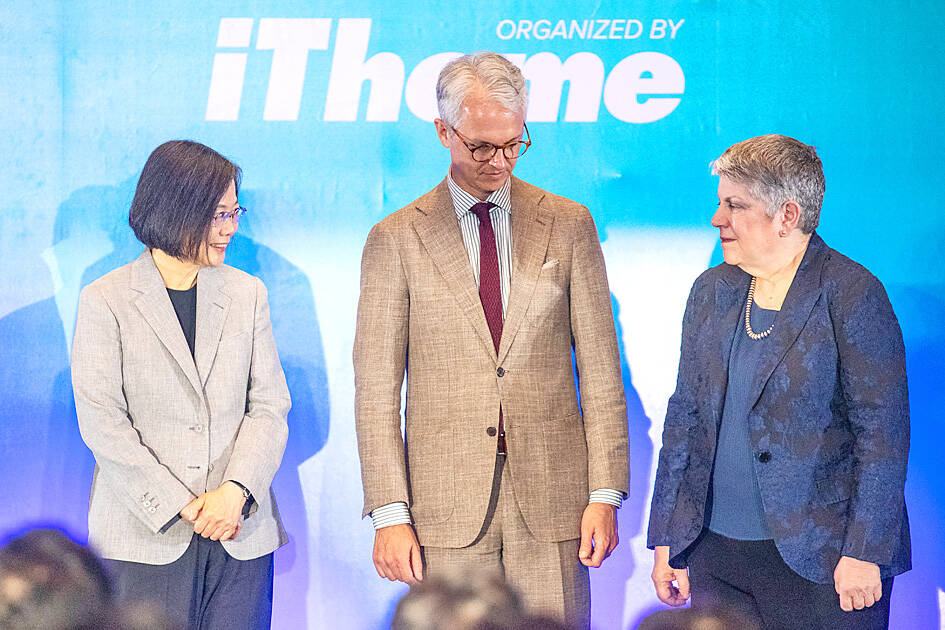Governments should work with the private sector and civic groups to bolster their countries’ cybersecurity efforts, former US secretary of homeland security Janet Napolitano said yesterday at the opening of a cybersecurity expo in Taipei.
Napolitano, who served as the department’s head from 2009 to 2013, said that governments should “enlist” the private sector and civil society groups to promote readiness for cybersecurity threats.
An example of how collaboration between the public and private sectors could make cyberconnections more secure was a department campaign that encouraged the public to provide tips to law enforcement agencies, she said.

Photo: RITCHIE B. TONGO, EPA-EFE
She said that her former agency received “a significant volume of tips” about signs of terrorism and terrorism-related activities under the campaign known as “If you see something, say something,” and that the information was often “actionable.”
No matter how strong an organizational defense might be, there might be an adversary that can break through it, and what is important is to “mitigate vulnerability to cyberrisks,” Napolitano said.
Napolitano, whose visit to Taiwan was not previously announced, is a member of the Intelligence Advisory Board of US President Joe Biden’s administration.
She was invited to deliver remarks at Cybersec, a three-day expo in Taipei showcasing the latest products and services of more than 300 leading cybersecurity brands.
The event, which ends tomorrow, also features keynote speeches and panel discussions by cybersecurity experts, company executives and government officials, including President Tsai Ing-wen (蔡英文).
Napolitano said that the world’s center of gravity is shifting to Asia and that as regional powers grow into global powers, security vulnerabilities are also emerging.
However, through information-security resilience, there is hope that known and unknown risks can be reduced, she said.
This is the first time Napolitano, who is also the founder of the Center for Security in Politics at the University of California, Berkeley, has visited Taiwan.
Taiwan and the university have a long-term and stable relationship, and have held many student exchanges, she said, adding that the institution has more than 1,000 Taiwanese alumni and the number of students from Taiwan attending has increased by more than 60 percent in the past five years.
Berkeley also works with Taiwan’s Industrial Technology Research Institute, Taiwan Semiconductor Manufacturing Co (台積電), and other partners to support innovative projects, she said.
Speaking at the expo’s opening ceremony, Tsai said that her administration sees cybersecurity companies and experts, as well as civic groups, as “important partners” in the effort to enhance Taiwan’s cybersecurity and resilience to cyberattacks.
The government would continue to promote domestic research and development of cybersecurity products and services while encouraging investment in start-ups providing cybersecurity solutions, she said.
At the same time, Taiwan would also continue to seek international cooperation to bolster national security in cyberspace, she said.

Taiwan is gearing up to celebrate the New Year at events across the country, headlined by the annual countdown and Taipei 101 fireworks display at midnight. Many of the events are to be livesteamed online. See below for lineups and links: Taipei Taipei’s New Year’s Party 2026 is to begin at 7pm and run until 1am, with the theme “Sailing to the Future.” South Korean girl group KARA is headlining the concert at Taipei City Hall Plaza, with additional performances by Amber An (安心亞), Nick Chou (周湯豪), hip-hop trio Nine One One (玖壹壹), Bii (畢書盡), girl group Genblue (幻藍小熊) and more. The festivities are to

Auckland rang in 2026 with a downtown fireworks display launched from New Zealand’s tallest structure, Sky Tower, making it the first major city to greet the new year at a celebration dampened by rain, while crowds in Taipei braved the elements to watch Taipei 101’s display. South Pacific countries are the first to bid farewell to 2025. Clocks struck midnight in Auckland, with a population of 1.7 million, 18 hours before the famous ball was to drop in New York’s Times Square. The five-minute display involved 3,500 fireworks launched from the 240m Sky Tower. Smaller community events were canceled across New Zealand’s

‘IRRESPONSIBLE’: Beijing’s constant disruption of the ‘status quo’ in the Taiwan Strait has damaged peace, stability and security in the Indo-Pacific region, MOFA said The Presidential Office yesterday condemned China’s launch of another military drill around Taiwan, saying such actions are a “unilateral provocation” that destabilizes regional peace and stability. China should immediately stop the irresponsible and provocative actions, Presidential Office spokeswoman Karen Kuo (郭雅慧) said, after the Chinese People’s Liberation Army (PLA) yesterday announced the start of a new round of joint exercises around Taiwan by the army, navy and air force, which it said were approaching “from different directions.” Code-named “Justice Mission 2025,” the exercises would be conducted in the Taiwan Strait and in areas north, southwest, southeast and east of Taiwan

UNDER WAY: The contract for advanced sensor systems would be fulfilled in Florida, and is expected to be completed by June 2031, the Pentagon said Lockheed Martin has been given a contract involving foreign military sales to Taiwan to meet what Washington calls “an urgent operational need” of Taiwan’s air force, the Pentagon said on Wednesday. The contract has a ceiling value of US$328.5 million, with US$157.3 million in foreign military sales funds obligated at the time of award, the Pentagon said in a statement. “This contract provides for the procurement and delivery of 55 Infrared Search and Track Legion Enhanced Sensor Pods, processors, pod containers and processor containers required to meet the urgent operational need of the Taiwan air force,” it said. The contract’s work would be